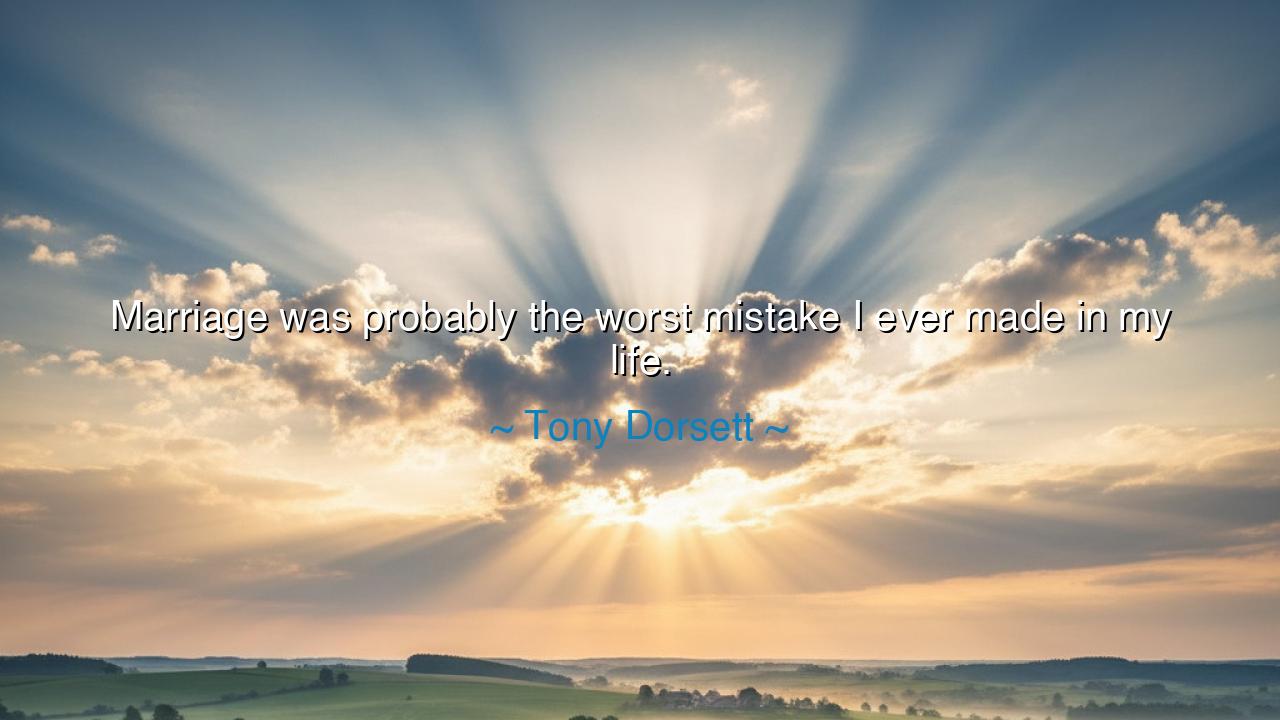
Marriage was probably the worst mistake I ever made in my life.






“Marriage was probably the worst mistake I ever made in my life.” — Tony Dorsett
In this stark and sorrowful confession, Tony Dorsett, the legendary football player known for his strength and grace on the field, reveals a different kind of struggle — one that takes place not in stadiums, but in the quiet chambers of the heart. His words are not the boast of bitterness, but the weary reflection of a man who has seen victory and defeat in both life and love. When he calls marriage his “worst mistake,” he does not speak to condemn the institution itself, but to acknowledge the pain that arises when love and destiny fall out of harmony. His voice, stripped of pride, becomes a mirror in which all who have loved and lost may see themselves.
From the dawn of civilization, marriage has been revered as sacred — a covenant that binds two souls in mutual devotion and sacrifice. Yet, as the ancients knew, what is sacred is also perilous. For when the heart enters into covenant unprepared, the bond meant to uplift can become a burden that bends the spirit. Dorsett’s lament echoes this timeless truth: that love, when entered without clarity or balance, can wound as deeply as it once healed. Many through the ages — from kings to poets, from warriors to saints — have found that their greatest mistakes were not those of conquest or ambition, but of the heart.
Consider the story of King Henry VIII, who sought love within the halls of power but found instead a trail of ruin. His marriages, meant to secure legacy and companionship, became instruments of division and sorrow. Yet his tale, like Dorsett’s reflection, reminds us that failure in love does not make one loveless — it reveals the frailty of human desire and the difficulty of aligning passion with wisdom. Even in the ruins of broken unions, there lies the chance for self-knowledge — the understanding that love, to endure, must be built not only on feeling but on faith, patience, and truth.
In Dorsett’s words, there is also an undertone of humility, the kind that only comes after the storms of life have passed. He speaks as a man who once mastered his craft — who conquered the field with power and grace — yet could not master the delicate art of sustaining a union of hearts. It is a confession that strength in one realm does not guarantee wisdom in another. Love, unlike sport, has no finish line and no trophy. It demands surrender rather than dominance, understanding rather than victory. His failure, then, becomes a lesson for all who chase success: that no triumph in the world can replace the quiet triumph of peace within the home.
The ancients would have said that marriage is the forge of the soul. Within it, the impurities of ego and impatience are burned away, leaving only the gold of character — if one can endure the fire. But for some, the heat becomes too great. When Dorsett calls marriage his “worst mistake,” it may be that he entered the forge before his spirit was ready, or that the metals of two souls could not blend without breaking. His honesty, though painful, carries wisdom: that one must approach love not as a conquest, but as a calling — one that demands humility, faith, and readiness.
Yet even in regret, there is redemption. To recognize a mistake is the first act of wisdom; to learn from it is the beginning of renewal. Many have stumbled in love and risen stronger, wiser, more compassionate. The poet Rumi once wrote, “The wound is the place where the light enters you.” In Dorsett’s lament, we can hear that same truth. The failure of marriage, painful though it may be, can become the soil in which understanding grows — a chance to learn what it truly means to love, and to be loved in return.
So let this be the teaching drawn from Dorsett’s words: marriage is not for the unexamined heart. Do not enter it for comfort, status, or desire alone, but with the solemn awareness that love is both joy and labor. Seek not perfection in another, but partnership in imperfection. And if love should fail, let the failure teach you, not harden you. For every broken bond, if faced with humility, can become a step toward wisdom — and even in the ashes of regret, the soul can still find light. Thus, the man who once called marriage his “worst mistake” may yet, in time, find that it was also one of his greatest teachers.






AAdministratorAdministrator
Welcome, honored guests. Please leave a comment, we will respond soon